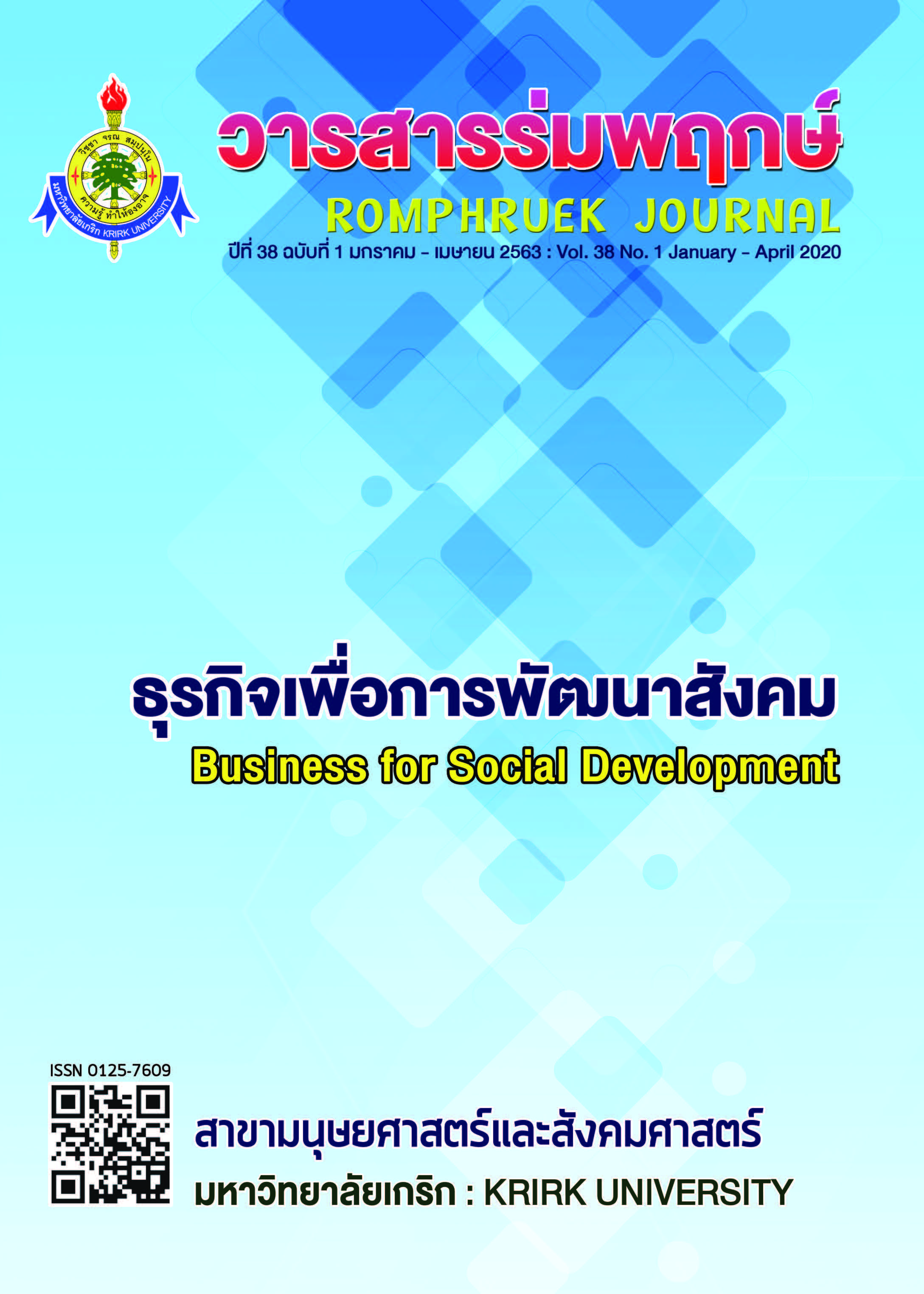Behavior of Generation Y towards Workplace Fun in Multinational Company in Thailand
Main Article Content
Abstract
This study aims to emphasize on the term “workplace fun” and its behavior towards job satisfaction and task performance. The research examined generation Y’s attitude towards workplace fun in MNCs in Thailand due to the fact that they will invade half of Thailand’s workforce by 2030 according to the data of the National Statistical Office of Thailand (2015) and workplace fun has been widely used in MNCs but very minimal in Thai local companies.
The study relied upon survey data collected from 443 respondents representing the employees who are working in Multinational Company in Thailand. By applying descriptive and inferential statistics, the study has found that generation Y employees in MNCs are a true believer of workplace fun concept as well as indicated that higher exposure on experienced workplace fun leads to higher employee’s job satisfaction and task performance. This paper serves to change Thai traditional management negative view of having fun in the workplace and direct for future work so that it may continue growing to inprove Human Resource Management knowledge.
Article Details
Every article published in the Romphruek Journal of the Humanities and Social Sciences is the opinion and point of view of the authors. Thery're not the viewpoint of Krirk University or the editored department. Any part or all of the articles for pablication must be clearly cited.
References
Aldag, R. and Sherony, K. (2001). A spoonful of sugar : some thoughts on fun at work.
Current Issues in Management, 1(1), 62-76.
Avolio, B.J., Howell, J.M. and Sosik, J.J. (2009). A funny thing happened on the way to the
bottom line : humor as a moderator of leadership style effects.
Academy of Management Journal, 42(2), 219-227.
Cammann, C., Fichman, M., Jenkins, G. D. and Klesh, J. (1983). Assessing the attitudes and perceptions
of organizational members. New York, NY : Wiley.
Eisner, S.P. (2005). Managing Generation Y. SAM Advanced Management Journal, 70(4), 4- 15.
Ford, R.C., McLaughlin, F.S. and Newstrom, J.W. (2005). Creating and sustaining fun work
environments in hospitality and service organizations.
Journal of Human Resources in Hospitality &Tourism, 4(1), 11-30.
Howe, N. and Strauss, W. (2000). Millennials Rising : The Next Great Generation.
New York, NY : Vintage Books.
Karl, K., & Harland, L. (2005). What’ fun and what’s not : An examination of age, gender difference,
and attitudes toward fun activities at work. Proceedings from the Midwest Academy of Management,
Chicago : IL.
Karl, K., Peluchette, J., and Hall, L. (2008). Give them something to smile about : a marketing strategy
for recruiting and retaining volunteers. Journal of Nonprofit & Public Sector Marketing, 20(1), 71-96.
Karl, K., Peluchette, J., and Harland, L. (2007). Is fun for everyone? Personality differences in healthcare
providers' attitudes toward fun. Journal of Health & Human Services Admi -nistration, 29(4), 409-447.
Karl, K., Peluchette, J., Hall, L. and Harland, L. (2005). Attitudes toward workplace fun : a three sector comparison. Journal of Leadership & Organizational Studies, 12(2), 1-17.
Kengkarnchang, Kanpitcha. (2013). Generation Y and a New Challenge in a Human Resources Administration. Journal of Social Sciences and Liberal Arts, 2(1), 17-25.
Komet Suphonphak. (2012).“Perception and Communication for Cultural Diversity Management of
Multinational Corporations in Thailand”. Faculty of Communication Arts, Chulalong -korn University. Bangkok.
Lamm, E. and Meeks, M.D. (2009). Workplace fun : the moderating effects of generational differences.
Employee Relations, 31(6), 613-631.
Motowidlo, S.J., Borman, W. and Schmit, M.J. (1997). A theory of individual difference in task and contextual performance. Human Performance, 10, 71-83.
National Statistical Office of Thailand. (2015). Population in Thailand. (September15, 2017).
Retrieved from https://www.nso.go.th.
Newstrom, J.W. (2002). Making work fun: an important role of managers.
SAM Advanced Management Journal, 67(1), 4-9.
Robbins, S.P. and Judge, T.A. (2010). Essentials of Organizational Behavior.
thed., Upper Saddle River, NJ : Pearson Education.
Schewe, C.D. and Noble, S.M. (2000). Market segmentation by cohorts: the value and validity
of cohorts in American and abroad. Journal of Marketing Management, 16(1-3), 129-42.
Weiss, H.M. (2002). Deconstructing job satisfaction : separating evaluations, beliefs and affective experiences. Human Resource Management Review, 12(2), 173-194.
Williams, L.J. and Anderson, S.E. (1991). Job satisfaction and organizational commitment as predictors
of organizational citizenship and in-role behaviors. Journal of Management, 17(3), 601-617.
Wright, T.A. (2006). The emergence of job satisfaction in organizational behavior: A historical overview
of the dawn of job attitude research. Journal of Management History, 12(3), 262-277.
Young, G.C., Kwon, J., and Kim, W. (2013). Effects of attitudes vs experience of workplace fun on
employee behaviors. International Journal of Contemporary Hospitality Management, 25(3), 410-427.


